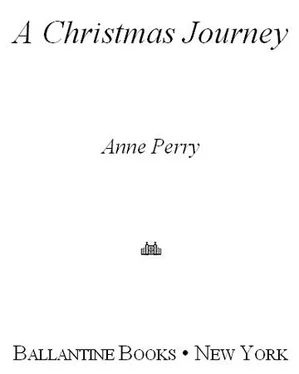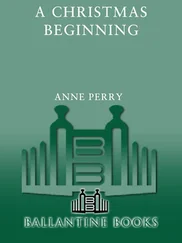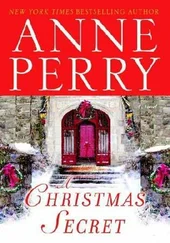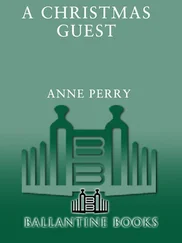“Then I will tell you,” Mrs. Naylor answered for her. “You were afraid she would not make it alone, her courage would fail her, and she would take the many excuses to turn back, if not the first, then the second. Why? What does it matter to you if she fails?”
Vespasia thought for only a moment, then she spoke with absolute certainty. “Omegus Jones spoke of a pilgrimage of expiation, in medieval times,” she said. “Then it was so dangerous that often the traveler did not return, but it was an act of supreme friendship for a companion to go with them. It seemed right to me to go, perhaps for my own reasons as well as hers.” Only as she said the words did she realize their truth. She had her own expiation to make, for Rome, for dreams she should not have allowed herself to entertain, journeys of the heart she should not have made.
“I see,” Mrs. Naylor said. “This Mr. Jones seems to be a remarkable man.”
“Yes,” Vespasia agreed too quickly, and too sincerely.
Mrs. Naylor smiled. “And that also, I think, has something to do with your reason!”
Vespasia found herself blushing, something she had not done in some time. She was accustomed to being in control—of herself, if not always of the situation.
“Those of us who have lived any of our passions have something to expiate,” Mrs. Naylor said gently. “And those who have nothing are the more to be pitied. My father used to say that if you have never made a mistake, then you have probably never made anything at all. Perhaps Mrs. Alvie will realize that in time also. I shall return with you tomorrow, when the ponies have had time to rest and to eat. I have my own journey to make. We shall follow the High Road south, to Tyndrum, and Crianlarich, to Loch Lomond, and from there to Glasgow where we can find a train to London. It will take several days. How many will depend upon the weather, but we should be at Applecross before Christmas.” She stood up. “You may do as you please today, but I would suggest that you do not leave the house. You don’t know your way, and the Orchy is a hungry river. It reaches out from its banks and claims many lives.”
“Mrs. Naylor?”
She turned. “Yes?”
“What is it in this place that holds you?” It was an impertinent question, yet she wished to know so intensely that she defied all the rules of courtesy to ask.
“It is a place of rest on my own journey, Lady Vespasia. Perhaps after I have bidden farewell to my daughter, it may even prove to be the end of it. Why or how is not your concern.” She walked to the door, her back ramrod straight, her head high.
Vespasia did not need to be told that the value of Glen Orchy had much to do with Finn, but she was still turning over in her mind the nature of Mrs. Naylor’s journey. They had been speaking of the road to answer for mistakes, a nicer word than sins, but it held more than the suggestion of mere error. They both knew they were speaking not merely of judgment, but of morality.
She sat in bed sipping her tea and thinking of Kilmuir’s terrible death, and the rumors that Isobel had heard, and the gardener’s sudden silence at Muir-of-Ord, and most of all of Gwendolen’s face when Isobel had suggested obliquely that she could have been attracted to a footman, had he the social position to offer her.
Was Kilmuir really so desperate for children he would have put Gwendolen away by slandering her so completely that society would accept his act, and then marrying Dolly Twyford, leaving Gwendolen an outcast, branded a whore?
Her imagination raced! The possibilities were hideous! She thought of her own children, still little, but one day they would grow up, marry suitably, one hoped with love. What would she do if her daughter faced such ruin of her life? She pictured Kilmuir out driving in the carriage with Mrs. Naylor, the horse taking fright, Kilmuir overbalancing and falling, his wrists caught in the reins. The answer was there in her mind. She would have seized the chance and pushed him and whipped up the horses; at least, she would have thought of it! Whether she would ever have done it she could not know; please God, she would never find out.
Was that what had happened? And Gwendolen had seen it? That was the estrangement between her and her mother. Either she had never realized Kilmuir’s plan, or she had refused to believe it. Or perhaps she had willed herself to forget it afterwards, to imagine that somehow he would change his mind, and it would all be all right. He would love her again and deny the rumors. Dolly Twyford would recede into the past. Maybe one day she would even have the longed-for children herself!
And then Mrs. Naylor had ruined it! That would be an estrangement sufficient to send Gwendolen to London, and keep her mother in the farthest reaches of Scotland, farther even than Muir-of-Ord. Perhaps only Glen Orchy would answer that guilt, and maybe even the fear of exposure. Who else might know? Only the staff of the house where it had happened, and they would keep silence, if not from loyalty, then at least for lack of proof. But Mrs. Naylor would no longer wish to live there.
And if she had not done it, would Kilmuir have gone ahead and first slandered Gwendolen and then cast her aside, destitute, and with no home, no friends, no reputation, no skills to earn her own way, except to sell her body on the streets, or more probably, to take her life—as in the end she had done?
Was that what she had heard in Isobel’s remark—a beginning of the old accusation again? Was it history repeating itself, and Bertie Rosythe believing just as Kilmuir had pretended to? That might indeed make her despair and embrace death of her own choosing before ruin should overtake her. There was no mother to defend her this time.
How desperately alone she must have felt—a second time falsely accused, and no denial would help. How can one deny something that has only been hinted at, never said? Some people might have attacked in return, but where would that end? Almost certainly in a defeat even more painful. This way ended it almost before it began, certainly before any but a handful of people knew of it.
And then the worst possibility of all struck her. Had Gwendolen believed that Isobel knew Kilmuir’s charge and was very subtly telling her so, and threatening a lifelong blackmail, a cat-and-mouse torture never to end? If that was true, no wonder she had killed herself! The thought was hideous beyond the mind to realize. Could it even be true? She hated herself that she could even frame the idea—but Isobel’s anger, her need came sharply into focus, as if it had been moments ago that Vespasia had seen the look in her eyes, the desperation for her own social position and safety. Then sanity reasserted itself and she thrust it away. It had been a moment’s cruelty, no more.
She rose and dressed at last, weighed down by a sadness and an overwhelming pity for both Gwendolen and Mrs. Naylor. She went downstairs to find breakfast; she knew the wisdom of not attempting anything on an empty stomach, however little she felt like eating.
She found Isobel downstairs, pacing the floor. She turned around the moment she heard Vespasia’s footsteps. She looked very pale, dark circles around her eyes making her look ill. “Where have you been?” she demanded.
“I slept late,” Vespasia answered. “And I did not get up immediately.” That was true as far as it went. She had decided not to tell Isobel of her conversation with Mrs. Naylor, and certainly not of the thoughts that had resulted from it. She was ashamed of where it had led her. She liked Isobel, she always had, but perhaps she did not now trust her as deeply as she once had.
“What are we going to do all day?” Isobel pressed. “What is this place, do you suppose? I have seen all sorts of people here, as if it were a religious retreat.”
Читать дальше










